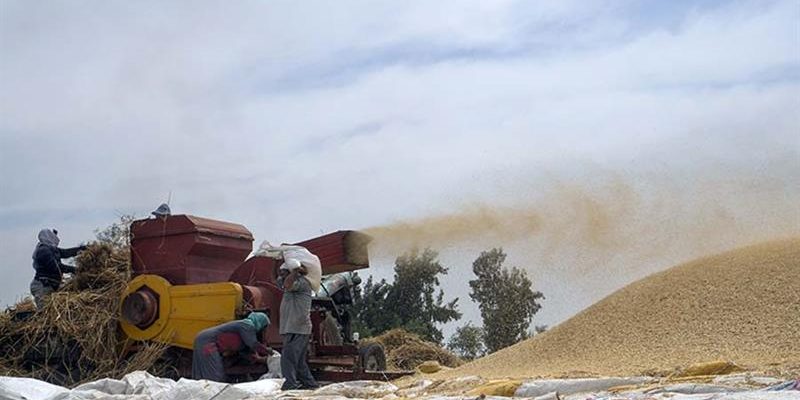Assistant to the Minister of Foreign Affairs for European Affairs Ehab Nasr met with UN Coordinator for the Black Sea Grain Initiative Abdallah Dashti on Sunday, when he reaffirmed Egypt’s support for efforts aimed at ensuring the flow of grain to ensure global food security and the stability of food prices, especially of the grains, fodder, and food oils included in the initiative.
The Black Sea grain deal, which was scheduled to expire on 18 May, has been extended for two more months. It is an agreement between Russia and Ukraine made with Turkey and the UN after the Russian invasion of Ukraine. Signed in July 2022, it allows for commercial food and fertiliser (including ammonia) exports from three key Ukrainian ports in the Black Sea — Odessa, Chornomorsk, and Yuzhny/Pivdennyi.
The agreement ensures that Egypt can secure its needs for wheat. Before the Russia-Ukraine war broke out, Egypt had been procuring 85 per cent of its total wheat imports from these two countries, 60 per cent from Russia and 25 per cent from Ukraine.
Despite reports that Egypt has deferred payments for its wheat purchases, in some cases by months, due to hard-currency problems, experts stress that there is no sign of problems.
According to Ibrahim Ashmawi, assistant minister of supply and head of the Internal Trade Development Authority, “statements about [Egypt’s] inability to [pay] for imported wheat shipments are completely false.”
“Egypt, being one of the largest consumers and importers of wheat globally, maintains business relationships with 25 wheat suppliers across the world. While there may be negotiations on specific payment terms in some transactions, Egypt always honours its commitments to its wheat suppliers,” Ashmawi said.
Egypt’s “import agreements for wheat are typically futures contracts that require payments to be made within six months. If we ask to extend the 180 days to 200 days, that does not mean we are not compliant,” he added.
Ashraf Kamal, a professor of agricultural economics and researcher at the Agricultural Research Centre in Cairo, concurred. “Egypt has two types of import contracts: those in which the payment is made promptly, and futures contracts in which payment is made after an agreed-upon period,” he said.
It is common in the agricultural produce market to sign futures contracts, he noted.
The global wheat harvest occurs at varying times throughout the year, which ensures a continuous supply of wheat. For instance, crops in Chile, Australia, and New Zealand are typically harvested from December to February, while Egypt’s wheat harvest takes place in April and May.
Russia and Ukraine harvest their wheat during July and August, whereas Canada’s wheat is harvested from September to October. As a result, the availability of wheat in the global market remains stable and consistent throughout the year.
At the domestic level, Egypt has implemented measures to ensure that wheat, a staple food, is steadily available. The country has adopted proactive steps in response to the Russia-Ukraine war, focusing on increasing the domestic wheat harvest by offering more incentives to farmers.
Before the planting season, the government decided to pay LE1,250 for every ardeb (150 kg) supplied by farmers. With the commencement of the harvest season, and according to presidential directives, the price of an ardeb rose to LE1,500.
Kamal pointed out that this price is equivalent to the international one, adding that the price of a ton of wheat before the Ukraine war was $250. It rose to $500 when the war started, but then decreased again though not to the initial price.
This season, Egypt has increased the amount of land cultivated with wheat to 3.65 million feddans to produce 10 million ton of wheat, said head of the National Wheat Campaign Reda Mohamed Ali.
The country has also worked on improving the quality of the wheat produced by training farmers in “guided fields”, or land in which steps are used to educate farmers. Ali said that this year there were 7,100 such fields, up from 3,500 last year.
He added that new kinds of wheat that are resistant to heat and salinity have also been used in reclaimed lands, such as in the Ganet Masr project.
Egypt has also reclaimed hundreds of thousands of feddans of land in desert areas to expand its wheat cultivation and provided high-quality seeds, fertilisers, and pesticides.
The Ministry of Agriculture and Land Reclamation launched the Food and Agriculture Initiative for Sustainable Transformation during the UN COP27 Climate Summit last year. The initiative seeks to raise interest in food production and provide safe and diverse food products, especially wheat, Ali said.
The present wheat season has been successful, with a 20 per cent increase in supply totalling 2.9 million tons thus far.
Egypt also has a strategic reserve of wheat that will last beyond November, Ashmawi said, adding that it has imported over five million tons of wheat from various origins this fiscal year with no delays in payment, although the terms of letters of credit may be extended.
Civil society has also played a significant role in supporting Egypt’s efforts to secure its most strategic food commodity. The Ezraa (cultivate) initiative, launched by the Coptic Evangelical Organisation for Social Services under the umbrella of the National Alliance for Civil Development in October 2022, aims to cultivate 150,000 feddans of land for wheat by collaborating with 100,000 farmers across 300 villages in eight governorates.
The initiative expands the area cultivated with wheat by providing high-quality seeds in cooperation with the Ministry of Agriculture.
Following the beginning of the war, Egypt took measures to secure its wheat supply, including diversifying its import sources, including from Bulgaria, Romania, Serbia, Argentina, Canada, France, Germany, and New Zealand, said Kamal.
He added that Egypt’s good relations with these countries had helped to create a stockpile of the strategic crop.
The total world production of wheat is estimated at 800 million tons, of which only 200 million tons are traded globally. This is more than for rice, of which only five per cent of global production is traded due to its high consumption in Asian countries, Kamal said.
* A version of this article appears in print in the 1 June, 2023 edition of Al-Ahram Weekly
Short link:








